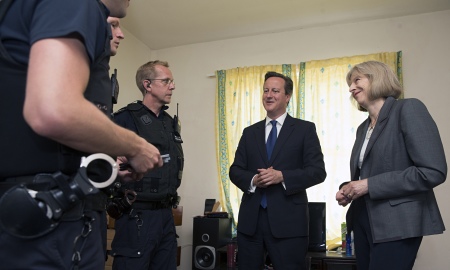
David Cameron has angered civil rights groups and political opponents by using an immigration raid as a photo opportunity.
Mr Cameron accompanied immigration officers on a raid of a house in Slough which was said to have been home to four Albanians who were living in the country illegally. After the suspects had been removed from the house and it was declared safe for the prime minister, he posed for photos with the Home Secretary, Theresa May, and gave press interviews about changes to the UK’s immigration system which he had announced earlier that day.
Shami Chakrabarti, the director of rights group Liberty, said that the decision to pose for the photoshoot was in ‘bad taste’ and that it was ‘constitutionally inappropriate for elected politicians to intervene in law enforcement’. Ms Chakrabarti questioned whether legally the prime minister had the right to enter the premises. She said it was even more inappropriate for him to pose for photos as well. In an interview reported in The Guardian, she said: ‘Who gave Mr Cameron permission to look round these premises? Being prime minister doesn’t give you the right to enter private property willy-nilly’.
In an interview with ITN conducted at the house, the prime minister said: “What we’re doing today, is making a series of changes which says to people, ‘if you come here illegally, we will make it harder for you to have a home, to get a car, to have a job, to get a bank account and when we find you, and we will find you, we will send you back to the country you came from’.”
Don Flynn of the Migrant Rights Network said that it was ‘distasteful’ that the prime minister had joined the raid and the Labour MP Tom Watson described Mr Cameron’s attendance as ‘improper’. He said that it was “improper for Cameron to be engaging in a PR stunt over alleged illegal immigration before people involved in the raid have been to trial or tribunal”. He added “They deserve due process and it will be much harder for them to achieve that now that the prime minister has led a media circus to their home”.
Critics see the move as a cynical ploy to woo back voters who are tempted towards UKIP because of their hard anti-immigration stance. Political analyst Sanwar Ali said, “Clearly Mr Cameron has calculated that he will win votes with this PR opportunity. It may well persuade some UKIP voters to come back to the Conservative fold as a result of it but it may also make more moderate Conservatives uncomfortable.
“Mr Cameron has spent several years trying to persuade voters that the Conservatives are not ‘the nasty party’. Photo opportunities like this one could undo that work”. Theresa May first referred to the Conservative Party as ‘the Nasty Party’ in 2002. She warned the Conservative Party Conference that the party was too insular, drew its support from too narrow a base and was seen by others as ‘the nasty party’. The phrase stuck.
When Mr Cameron became Conservative leader in 2005, he immediately set about broadening the base, appealing to ethnic minorities and women and pretending to care about the environment. Now, it seems, after an electoral shock earlier this year, Mr Cameron has had a change of heart.
At the recent European Parliament (EP) elections held in late May, UKIP came first in the poll taking 27.5% of the votes cast and winning 24 of the 73 EP seats. A great deal of UKIP’s support came from traditional Conservative supporters and Mr Cameron, and his Australian election strategist Lynton Crosby, want to win them back. The EU election was decided using a system of proportional representation. The Westminster election will be held using a ‘first past the post’ system which will make it almost impossible for UKIP to repeat its success. The Liberal Democrat Party, formerly Britain’s electorate’s third favourite party, are, like UKIP, strong supporters of a change to a system of proportional representation which, both parties say, would better reflect the political mood of the country.








